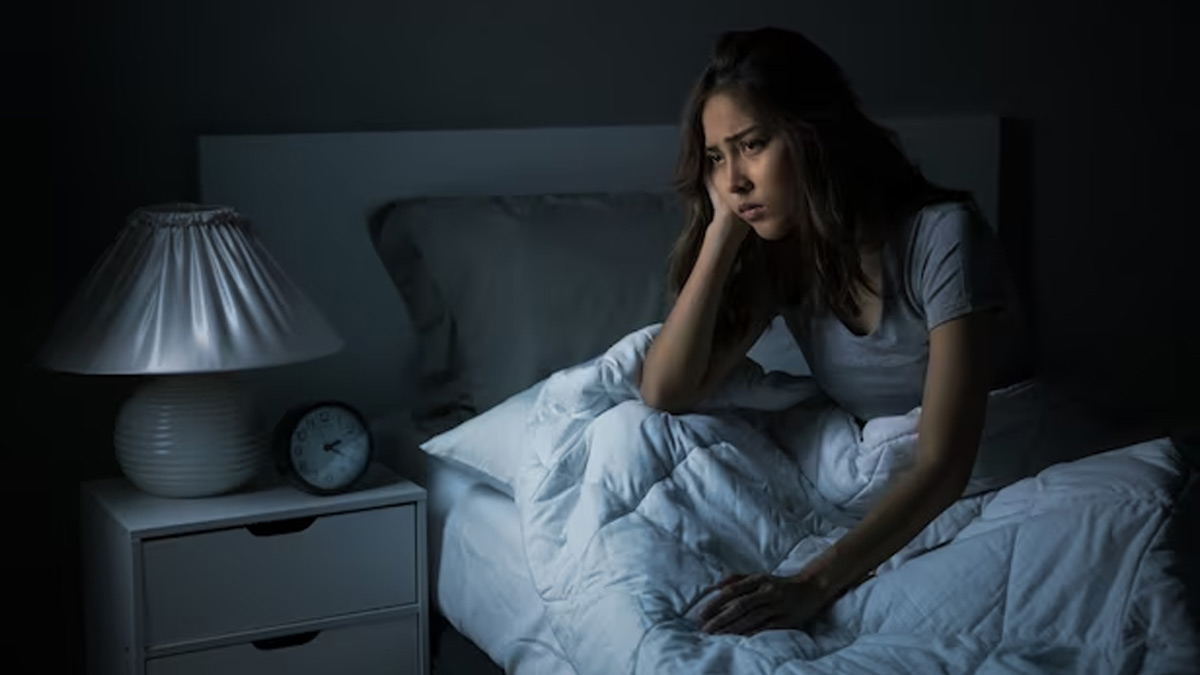
Sleep is essential for our physical and mental well-being, yet many individuals experience sleep anxiety, a condition that can significantly impact the quality of rest and our overall well-being.
According to the Sleep Foundation, sleep anxiety, also known as somniphobia, refers to the fear or anxiety associated with the act of falling asleep or staying asleep. It can manifest in various forms, ranging from general unease about bedtime to intense anxiety that interferes with the ability to sleep.
Table of Content:-
Signs Of Sleep Anxiety

The Sleep Foundation shared that sleep anxiety can cause nightmares and disturbing dreams that further disrupt your sleep. Some signs of sleep anxiety are:
- Racing Thoughts: Persistent and racing thoughts when trying to sleep can be a sign of sleep anxiety. Overthinking about the past, present, or future can hinder the relaxation needed for sleep.
- Physical Symptoms: Physical manifestations such as increased heart rate, muscle tension, and sweating may accompany sleep anxiety, making it challenging to unwind.
- Difficulty Falling Asleep: Individuals with sleep anxiety may find it difficult to initiate sleep, spending extended periods tossing and turning in bed.
- Nightmares or Night Sweats: Sleep anxiety can contribute to vivid nightmares or night sweats, leading to disrupted sleep patterns.
Managing Sleep Anxiety

The Sleep Foundation further warned that disrupted sleep can lead to obesity, diabetes, and heart disease. Hence, it is essential for people dealing with sleep anxiety, to be able to manage it effectively:
- Establish a Relaxing Bedtime Routine: Create a calming pre-sleep routine to signal to your body that it's time to wind down. This may include activities like reading a book, taking a warm bath, or practising gentle yoga.
- Limit Stimulants: Avoid stimulants such as caffeine and nicotine close to bedtime, as they can heighten anxiety and interfere with sleep.
- Create a Comfortable Sleep Environment: Ensure your bedroom is conducive to sleep by maintaining a comfortable temperature, minimizing noise, and using blackout curtains.
- Cognitive Behavioral Therapy for Insomnia (CBT-I): CBT-I is an evidence-based therapeutic approach that addresses the thoughts and behaviours contributing to insomnia, including sleep anxiety.
- Mindfulness and Relaxation Techniques: Incorporate mindfulness meditation, deep breathing exercises, or progressive muscle relaxation into your daily routine to reduce overall anxiety levels.
- Professional Support: If sleep anxiety persists, seeking the guidance of a healthcare professional, such as a therapist or sleep specialist, can be beneficial in developing personalised strategies for managing and overcoming sleep-related fears.
Also Read: Can You Catch Up On Lost Sleep? Expert Informs The Dangerous Effects Of Sleep Debt
Sleep anxiety can significantly impact one's overall well-being, but with awareness and proactive measures, it is a condition that can be managed effectively. By implementing healthy sleep habits, seeking professional guidance when needed, and addressing the root causes of anxiety, individuals can foster a more restful and rejuvenating sleep experience.
Also watch this video
Read Next
Combination Of 7 Healthy Lifestyle Habits Can Cut The Risk Of Depression By 57%, Revealed Study
How we keep this article up to date:
We work with experts and keep a close eye on the latest in health and wellness. Whenever there is a new research or helpful information, we update our articles with accurate and useful advice.
Current Version
